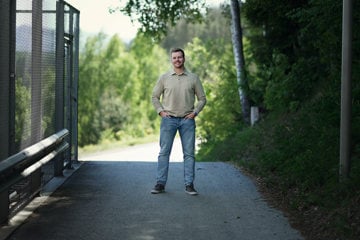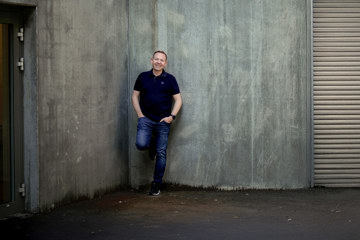
Making sustainability practical at Kongsberg Maritime
At Kongsberg Maritime, sustainability is not a separate initiative - it’s becoming a core part of how products are designed, built, and improved. In the Propulsion and Handling division, Elisabeth Lervåg Synnes plays a key role in this shift.
-
Text:Christine Oulie
Photo:©Andres Felipe Vargas Hoyos
Meet Elisabeth: a specialist role with a practical focus

As product sustainability lead, she works as a specialist supporting other specialists in the company with the data, tools, and processes they need to make informed, sustainable decisions.
“I see my role as enabling engineers to do their job with sustainability in mind - without adding unnecessary complexity,” Elisabeth says. “That means making sure they have access to the right materials, the right data, and the right systems at the right time.”
Elisabeth heads the Material Compliance Team, they maintain the company’s approved materials library, ensure compliance with substance regulations, and support bill of materials (BOM) analysis to prepare material declarations. “It’s about making sure we’re using the right materials and that we can document what materials and substances that goes into our products,” she explains.
She also leads the implementation of tools that embed sustainability into engineering workflows. One example is the Integrated Material Management module in Teamcenter, which centralizes and automates compliance processes. Another is a lifecycle assessment (LCA) tool currently under evaluation, which will help quantify the environmental footprint of products from raw materials to end-of-life.
“These tools are not just for reporting—they’re meant to support our product engineering specialists in making better decisions during development,” she says. “Decisions made early in the product development process, such as material selection and design choices, have a significant impact on a product`s environmental footprint. If we can support with sustainability data early, we can effectively balance off with product quality, time, and cost.”
Turning Targets into Action
Kongsberg Maritime has committed to reducing Scope 3 emissions - those from the use of sold products - by 25% by 2030. Elisabeth’s role is to help translate that target into practical steps at the product level.

“We calculate emissions based on a 25-year product lifetime,” she explains. “We look at the product’s rated power, load and operational factors, fuel type, and usage patterns. My job is to provide insight into the emissions from different products and to ensure that we are using consistent and accurate data. This will enable us to create plans for how to reach the target.”
Supporting Engineers with the Right Tools
Elisabeth describes her role as a specialist not in the sense of having all the answers, but in being a reliable point of contact:
“To me, being a specialist means being someone that, for example a product specialist can come to with questions about how to align product development requirements with Kongsberg Maritime`s Sustainability Key Performance Indicators. I may not always have the answer right away, but I know where to look, and I can help figure it out.”
She works closely with other specialist engineering teams to understand their workflows and make sure the tools and data provided are actually useful. “Engineers are the end users of our systems, tools and processes. If we don’t understand how they work, we can’t support them effectively.”
Her previous experience in production helps bridge the gap between sustainability goals and engineering reality. “It’s easier to have meaningful conversations when you understand the constraints they’re working with. I try to bring that perspective into everything I do.”
What Elisabeth enjoys most about her job is the variety. “Two days are never the same. I might be working on a tool rollout, analyzing emissions data, or collaborating with a team on a specific challenge. It’s a very hands-on and dynamic role, which I really enjoy.”
She also values the opportunity to stay connected to new developments. “We have access to a lot of internal expertise, and we’re involved in research projects and industry collaborations. We also learn a lot from our customers. That’s one of the benefits of working in a company like Kongsberg Maritime - you’re always learning.” For Elisabeth, the motivation behind her work is simple: “I chose this field because we can make a real impact. If we integrate sustainability early in the design phase, we can influence both environmental performance and product quality. That’s where I want to contribute.”
test test test
En fin fakta vi kan legge inn her fra sustainability rapporten eller fra Elisabeth? Noe som viser hva vi gjør / har fått til
-
Legge inn noe her
7 -
Legge inn noe her
51
From engineering to sustainability
Elisabeth’s path to her current role has been shaped by hands-on engineering experience. After earning a master’s degree in technology management from NTNU, she joined Kongsberg Maritime through the graduate program.
“I started as a manufacturing engineer and had the chance to work with thrusters in Ulsteinvik, hydraulic motors and steering gears in Brattvåg, and even spent time in Vietnam supporting winch production,” she recalls.
That early exposure to different parts of the business gave her a strong foundation in how products are developed and manufactured. Later, she was offered the opportunity to pursue an industrial PhD while remaining employed at Kongsberg Maritime.
“It came out of my involvement in three internal research projects about automated assembly in a low-volume industry context. I’m really grateful for that opportunity—it allowed me to go deep into the topic of design and development capabilities for transformation to automated assembly in the low-volume context while staying connected to real-world challenges.”
After completing her PhD, Elisabeth worked as an Engineering Operations Lead before transitioning into her current role.
"The biggest difference now is that I work across multiple product groups and focus more on systems, tools and processes. But my background in production is still very relevant—it helps me understand the practical side of what we’re trying to achieve"
Elisabeth’s career path demonstrates how in-depth product expertise can be a powerful driver of meaningful change. Her practical background enables her to effectively bridge the gap between strategic ambition and operational execution, integrating sustainability into the core of everyday engineering practices.
Different Paths, Same Curiosity
Meet Reidar, Jens-Ingeman, and Sondre—engineers at Kongsberg Maritime who each bring deep expertise in their field. Their career paths and technical focus areas are quite different, but they share one important trait: curiosity. If you're curious about what technical career paths looks like in practice, take a look at their stories.

